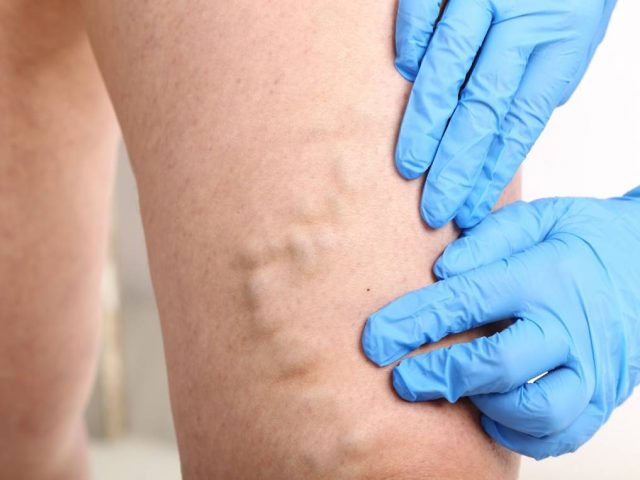Recent Blogs
- Pregnancy and Vein Health: Tips for Expecting Mothers to Stay Healthy
- What's Behind the Sudden Appearance of Pesky Spider Veins?
- Patient Testimonial 3 | Avis Hiller | Varicose Veins Treatment
- Bulging Veins (Varicose Veins)- A part of Pregnancy
- Can you travel after Vein Treatment?
- Have You Eliminated Dancing Because of Varicose Veins?
- What is The Cause For Itchy Varicose Veins?
- Countless advantages of wearing compression garments.
- How VenaSeal Treatment Works to Treat Varicose Veins
- Stretch Marks or Varicose Veins: How to Differentiate?
Published on: 20-Feb-2019

Varicose veins are a common health concern that affects millions of adults worldwide. These enlarged, twisted veins can lead to discomfort, swelling, and other complications if left untreated. Fortunately, modern medicine offers several effective solutions for managing this condition. In this article, we’ll explore what causes varicose veins, who is at risk, and the best treatment options available today, including those offered by CVC.
What Are Varicose Veins?
Varicose veins are a common vascular condition caused by the weakening or malfunction of venous valves. When these valves fail to function properly, blood flow becomes inefficient, leading to increased pressure within the veins. As a result, veins become enlarged, twisted, and visibly prominent, particularly in the lower extremities. The condition can also affect pelvic veins and, in men, testicular veins. In rare cases, congenital malformations may contribute to the development of varicose veins.
In addition to the physical discomfort and health risks associated with varicose veins, the condition also presents a significant cosmetic concern, particularly for women.
Who Is Affected by Varicose Veins and Why?
Varicose veins are common in both men and women. Research shows that about half of all women and one in four men will develop some form of vein disease. In women, pregnancy and childbirth often trigger the condition, while men may be affected due to leg injuries or physically demanding sports. Family history and genetics can also increase the likelihood of developing varicose veins.
Diagnostic Methods
The initial and most accessible diagnostic tool for varicose veins is a Doppler ultrasound of the lower extremities. This test, performed while the patient is standing, evaluates blood flow and valve function. In cases where pelvic vein involvement or congenital abnormalities are suspected, further imaging such as CT angiography or contrast-enhanced MRI may be necessary. These tests allow a more comprehensive assessment of the venous system and help pinpoint the source of venous insufficiency.
Modern Varicose Vein Treatments at CVC
Comprehensive Vein Care (CVC) offers state-of-the-art, minimally invasive treatments for varicose veins, each tailored to individual needs and anatomy. The following are the most advanced and widely used treatment options available at our clinic:
1. Sclerotherapy
Sclerotherapy involves the injection of a special solution directly into the affected vein. This causes the vein to collapse and be gradually reabsorbed by the body. Types of sclerotherapy include:
Laser-assisted sclerotherapy: Ideal for small veins, offers high precision.
Foam sclerotherapy: Used for larger veins and guided by ultrasound for improved accuracy.
Advantages: Painless, quick procedure with no downtime.
Consideration: Multiple sessions may be required for larger or more extensive veins.
2. ClosureFast Radiofrequency Ablation
ClosureFast is a catheter-based procedure that uses radiofrequency energy to heat and close off the diseased vein.
Advantages:
High success rate with minimal discomfort
Performed under local anesthesia
Patients can return to normal activities within 24 hours
ClosureFast is particularly effective for treating chronic venous insufficiency and large varicose veins.
3. Varithena
Varithena is an FDA-approved foam-based treatment designed for veins with significant reflux. It is injected into the vein to collapse the vessel and reroute blood flow through healthier veins.
Advantages:
Minimally invasive with fast results
Especially useful for veins that are difficult to treat with thermal methods
4. VenaSeal Closure System
VenaSeal uses a medical-grade adhesive to close diseased veins. Unlike thermal procedures, it does not require tumescent anesthesia or post-procedure compression stockings.
Advantages:
Minimal discomfort during and after the procedure
Rapid recovery and return to routine activities
Ideal for patients seeking a heat-free option
Duration, Recovery, and Long-Term Outlook
The duration of the treatment session varies from case to case. However, all procedures are performed on an outpatient basis. Most procedures, including ClosureFast and VenaSeal, involve only local anesthesia, allowing patients to return home shortly after the procedure.
Walking is encouraged immediately to reduce the risk of complications. Patients are generally advised to wear compression stockings for a few weeks post-treatment. Bruising or mild swelling may occur, but these side effects typically resolve within a few weeks.
Modern methods offer long-term relief, reducing the risk of recurrence. In the event of a relapse, these minimally invasive treatments can be safely repeated.
Take the Next Step with CVC
If you are experiencing discomfort, swelling, or visible veins, don’t wait. The earlier varicose veins are diagnosed and treated, the better the outcomes. At Comprehensive Vein Care, our board-certified vein specialist use the latest diagnostic tools and treatment options like Sclerotherapy, ClosureFast, Varithena, and VenaSeal to ensure safe, effective, and lasting results.
Book an appointment today.
Frequently Asked Questions
Q1. Are varicose veins dangerous?
While not always dangerous, untreated varicose veins can lead to complications such as ulcers, blood clots, or chronic venous insufficiency. Early treatment reduces these risks.
Q2. Do treatments hurt?
Most procedures at CVC are minimally invasive and involve little to no pain. Local anesthesia is typically used to ensure comfort during treatment.
Q3. How long does recovery take?
Recovery times vary by treatment. Most patients resume normal activities within 24 to 48 hours. Compression stockings may be needed for a few weeks.
Q4. Will the veins come back after treatment?
Treated veins do not return, but new varicose veins can develop over time. Follow-up care and healthy lifestyle habits help minimize recurrence.